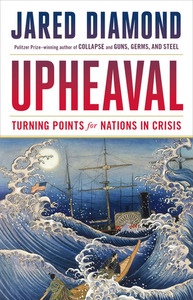Take a photo of a barcode or cover
We understand a lot about a person by looking at how they handle a crisis. I think the same applies to nations. I enjoyed getting to know these nations that I had never really read much about before: Australia, Indonesia, Finland, Chile, Meiji Japan. I feel curious to learn more about them and perhaps even visit these countries myself someday.
I genuinely liked the narrative style of the author, however one thing that frustrated me is the repetition of ideas (presumably for reinforcement) over and over. This is the main reason I've taken away 2 stars. It took me weeks to get through this book! I think it could have been a lot more concisely written without degrading the quality.
There are some interesting and valuable takeaways from the book. I particularly enjoyed the relevance to modern day global crises - especially the decline of democracy due to people not being willing to compromise. This blatant disregard for historical alternatives to democracy could prove fatal someday.
Reading about how nations have dealt with crises in the past, I am also ever more pessimistic that we will proactively manage the problems facing us. It seems like the only thing we're capable of is reacting to crises when they happen and adapting to new realties. Let's just hope that's still a viable option in the future.
I genuinely liked the narrative style of the author, however one thing that frustrated me is the repetition of ideas (presumably for reinforcement) over and over. This is the main reason I've taken away 2 stars. It took me weeks to get through this book! I think it could have been a lot more concisely written without degrading the quality.
There are some interesting and valuable takeaways from the book. I particularly enjoyed the relevance to modern day global crises - especially the decline of democracy due to people not being willing to compromise. This blatant disregard for historical alternatives to democracy could prove fatal someday.
Reading about how nations have dealt with crises in the past, I am also ever more pessimistic that we will proactively manage the problems facing us. It seems like the only thing we're capable of is reacting to crises when they happen and adapting to new realties. Let's just hope that's still a viable option in the future.
challenging
informative
reflective
sad
tense
medium-paced
informative
medium-paced
informative
reflective
medium-paced
challenging
informative
reflective
slow-paced
I am a huge Jared Diamond fan, and think his powers of geographical and anthropological synthesis are unparalleled, but Upheaval: Turning Points for Nations in Crisis didn't galvanize me as did his other books. In Guns, Germs and Steel and Collapse I felt the knowledge he shared was bursting out of him, whereas this time it struck me as just coming up with something else to give his publisher.
Even the overall focus of the book seemed contrived rather than organic. He didn't formulate a hypothesis and look for material to test it on, nor did he synthesize results from his extensive research. Instead he seemed to have said, "Here are 7 random countries I have spent a lot of time in. What can I use to tie them all together and write a book?"
The overarching theme became analyzing past and present crises for these 7 countries (Finland, Chile, Indonesia, Germany, Japan, Australia, and the United States) under the framework of psychotherapy. Diamond's wife has background in crisis counseling, and he borrows from her field to look at history and politics in a new way. For example, he asks about these nations' recognition of their problems, their strength of identity, how well they accept responsibility for their actions, what resources they have to model on or borrow from, etc. His hope is that using these questions the modern world will be better able to navigate the problems ahead. It seems to me, though, that these therapeutic queries would be far more effective in dealing with individuals in crisis than nations.
I found all the information he presented interesting and informative (though history is not really his field, and he is looking at the big picture), but the comprehensive framework of the book didn't really work for me. The post-war Germany section was my favorite, and I also enjoyed the chapters about present-day United States and Japan.
Thus, I'm sad to say, only 3.5 stars for this book. As Diamond is now over 80, who knows if he'll ever write more...
Even the overall focus of the book seemed contrived rather than organic. He didn't formulate a hypothesis and look for material to test it on, nor did he synthesize results from his extensive research. Instead he seemed to have said, "Here are 7 random countries I have spent a lot of time in. What can I use to tie them all together and write a book?"
The overarching theme became analyzing past and present crises for these 7 countries (Finland, Chile, Indonesia, Germany, Japan, Australia, and the United States) under the framework of psychotherapy. Diamond's wife has background in crisis counseling, and he borrows from her field to look at history and politics in a new way. For example, he asks about these nations' recognition of their problems, their strength of identity, how well they accept responsibility for their actions, what resources they have to model on or borrow from, etc. His hope is that using these questions the modern world will be better able to navigate the problems ahead. It seems to me, though, that these therapeutic queries would be far more effective in dealing with individuals in crisis than nations.
I found all the information he presented interesting and informative (though history is not really his field, and he is looking at the big picture), but the comprehensive framework of the book didn't really work for me. The post-war Germany section was my favorite, and I also enjoyed the chapters about present-day United States and Japan.
Thus, I'm sad to say, only 3.5 stars for this book. As Diamond is now over 80, who knows if he'll ever write more...
informative
informative
inspiring
reflective
medium-paced
challenging
informative
reflective
medium-paced
A quick read, and thought provoking. Despite Diamond saying the seven countries discussed in the book are the ones he's most familiar with, the discussions of them are mostly superficial and not particularly useful. I was actually annoyed by the Chile discussion, where he wrote something to the effect of "no-one knows why Pinochet was so brutal" but a mere page or two earlier he quotes the frequent pre-coup graffiti "Yakarta Viene", indicating that the Chilean Junta & Pinochet were openly using Indonesia as an example of how to carry out anti-communist crackdowns. Later, in the discussion of the 1965 Indonesian killings, he seems to equate the killings of at least half a million people with whatever disasters would have been caused by Sukarno remaining in power and the communists not being all murdered. I felt that Diamond understated the Cold War influences (and the US influence in particular) on both 1965 Indonesia & 1973 Chile.





